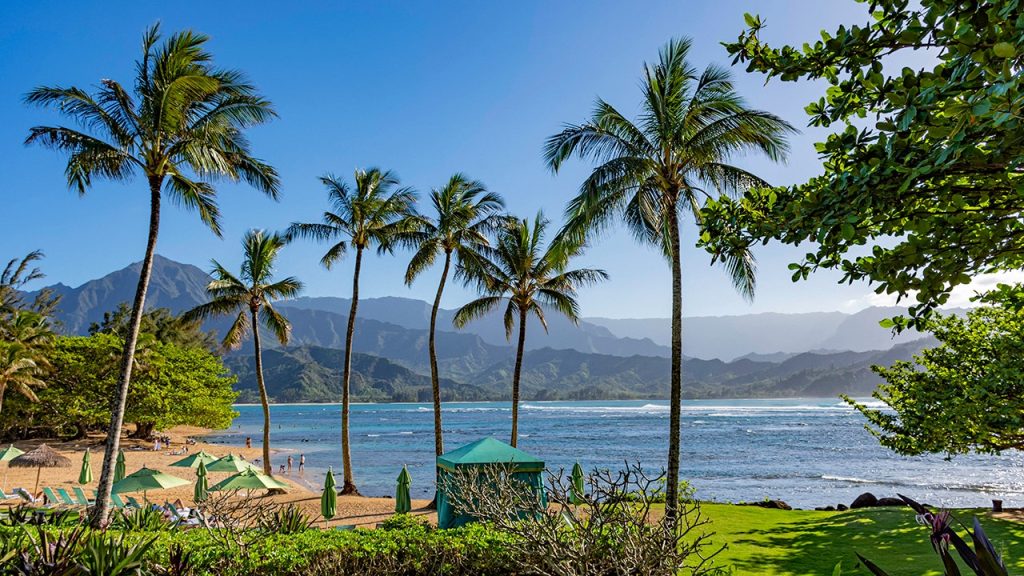Popular Hawaiian Beach Closed After Shark Attack
A beloved tourist destination in Hawaii has been temporarily closed following a shark attack on a local surfer. The incident, which occurred at Kaua’i island’s Hanalei Bay, has prompted authorities to take precautionary measures to ensure public safety while highlighting the rare but serious nature of shark encounters in U.S. coastal waters.
The attack took place shortly after 3 p.m. on November 5, when a local resident who was surfing in Hanalei Bay suffered injuries to his legs after being bitten by a shark. First responders quickly arrived at the scene to provide emergency treatment before transporting the victim to Wilcox Medical Center. Despite the swift response, authorities have not been able to determine either the size or species of shark involved in the incident, adding to concerns among local safety officials and beachgoers. The current condition of the surfer remains unavailable, leaving the community anxious for updates about their fellow island resident.
In response to the attack, officials have implemented immediate safety protocols throughout Hanalei Bay. “Shark Sighted” and “No Swimming” signs have been prominently posted along the beach, while lifeguards patrol the coastline to warn tourists and locals against entering the water. This popular vacation spot, known for its stunning views and ideal surfing conditions, now stands eerily quiet as visitors adjust their plans and authorities monitor the situation. Interestingly, the Hanalei Bay incident wasn’t isolated – on the same day, Po’ipū Beach, located approximately 45 miles away, also experienced closures after a 3-to-4-foot reef shark was spotted in nearby waters roughly two hours after the attack, suggesting a potentially unusual level of shark activity in the region.
The Kaua’i incidents contribute to what has been a relatively active year for shark encounters across American waters. According to tracking data, there have been 16 reported shark bites throughout the United States in 2023, with this recent attack adding to Hawaii’s statistics. While shark attacks often generate headlines and public concern, it’s worth noting their relative rarity – last year saw 71 reported bites worldwide, with only 47 classified as unprovoked attacks according to the Florida Museum of Natural History’s International Shark Attack File. These numbers, while concerning to those affected, represent an infinitesimally small percentage of beach visitors globally and remind us that such encounters, though frightening, remain statistically uncommon events.
For Hawaii’s coastal communities, which depend heavily on tourism and ocean recreation, shark incidents present a delicate balancing act between public safety and economic interests. Local authorities must weigh the need for beach closures against the impact on businesses and visitor experiences, all while providing transparent information about potential risks. The temporary closure of Hanalei Bay comes during a busy tourist season, affecting not just vacationers but also tour operators, surf instructors, and other businesses that rely on beach access. Meanwhile, marine biologists and conservation experts often use such incidents as opportunities to educate the public about shark behavior, emphasizing that these animals rarely target humans intentionally and that most bites result from mistaken identity or investigative behavior rather than predatory intent.
While beaches remain closed and investigations continue, the incident serves as a reminder of nature’s unpredictability and the respect it commands. Hawaii’s relationship with its ocean environment is deeply cultural and economic, with local communities having developed traditional knowledge about shark behavior over generations. Modern safety protocols build upon this understanding, incorporating advanced monitoring, warning systems, and education campaigns to minimize risk while allowing for continued enjoyment of Hawaii’s magnificent coastlines. As authorities determine when to reopen Hanalei Bay, visitors and locals alike will likely approach the water with heightened awareness – not abandoning their love for ocean activities, but carrying with them a deeper appreciation for sharing space with the ocean’s most misunderstood predators.


